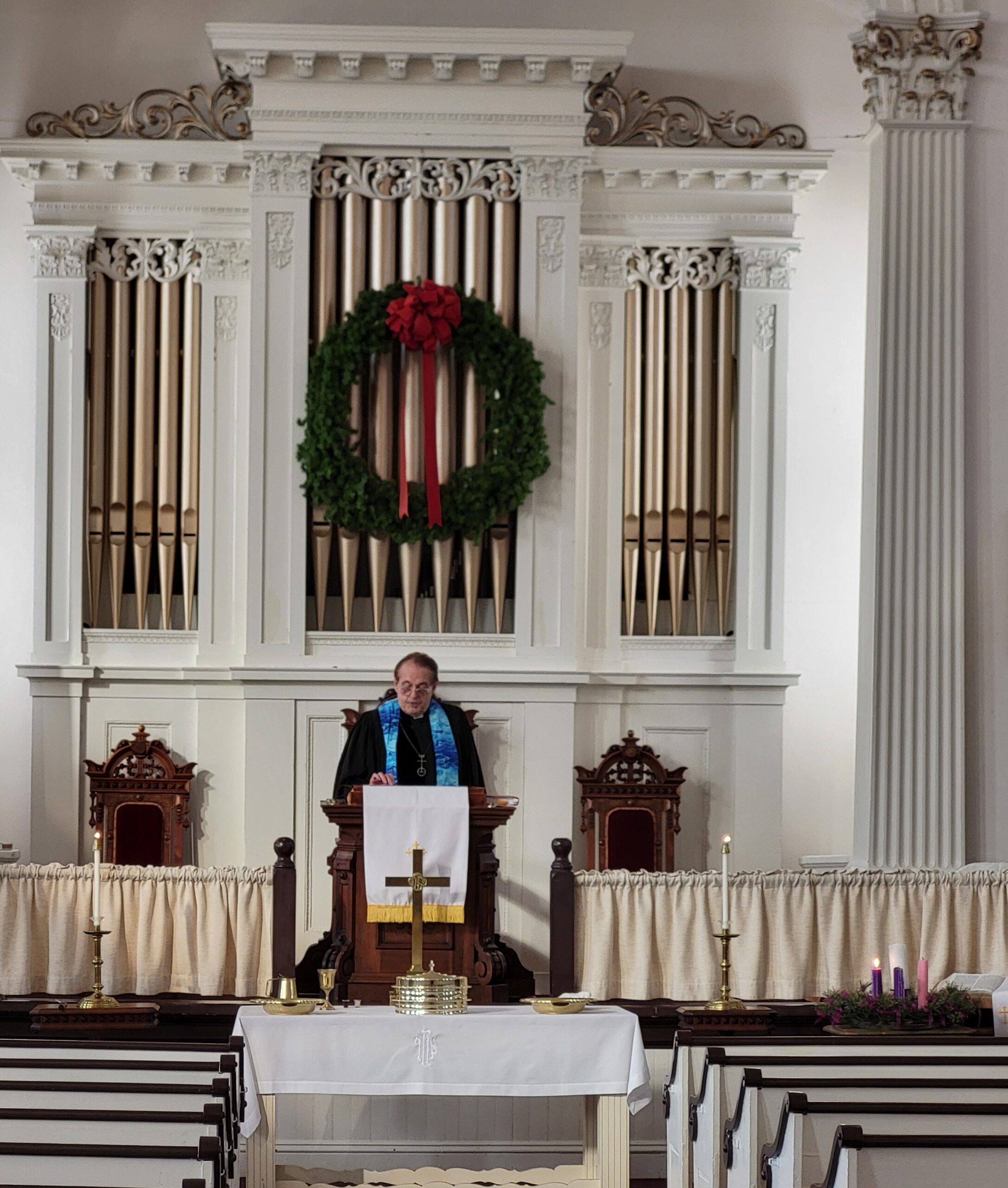Sermon Sunday December 1, 2024 – First Sunday of Advent – Candle of Hope
Rev. Norman A. Michaud
“The End of the Beginning”
Luke 21:25-35
This Sunday is the first Sunday of Advent. The first candle of Advent, the Candle of Hope, has been lit. Each week through the Advent Season, we will light candles to remind us of the coming Light of the World in the birth of Jesus. Each candle represents the light that will remind us of Hope, Peace, Joy, and Love. The Christ Candle will be lit on Christmas Eve, reminding us that all the symbolic candles are bound to the birth of Jesus.
Since the beginning of November, we have heard and seen that the Christmas season is upon us. We had yet to finish our Halloween candy before Christmas decorations began showing up in stores. Black Friday advertising and sales have been calling us for weeks, and even those deals that tempt us to buy now or else have passed. We may still consume Thanksgiving leftovers as Advent enters our anticipation of Christ’s birth.
It is worth recalling that our denomination’s founders did not celebrate Christmas. The Pilgrims believed that Christmas was a pagan holiday combining the Roman holiday of Saturnalia and other profane pagan celebrations. Since their goal was to “purify” their services from Roman Catholic and Episcopal forms of idolatry, in 1641, Cromwell banned the celebrations of Christmas in England. One could be punished if one was caught celebrating Christmas. The Massachusetts Bay Colony banned Christmas celebrations from 1659-1681. On this day in 1659, a law was passed by the General Court of Massachusetts Bay Colony requiring a five-shilling fine from anyone caught “observing any such day as Christmas or the like, either by forbearing of labor, feasting, or any other way.” Massachusetts repealed this law under pressure from the government in London in 1681. However, it was not until 1856 that Christmas Day became a state holiday in Massachusetts.
Charles Dickens is the person most responsible for creating Christmas as we know it. His “A Christmas Carol,” published in 1843, highlighted justice and generosity and turned British society and English readers to see Christmas as a time emphasizing social equity and healing. Scrooge’s gifts to Tiny Tim and his family were about sharing abundant life—as opposed to the stress of buying gifts for everyone to fill the space beneath a tree in our homes. Today, we are urged to hurry up and buy while supplies last!
The signs are everywhere: December 25 is coming. Seeing this may excite us as we picture idyllic Christmas landscapes in Massachusetts. Perhaps we’re nervous, trying to figure out how to rob Peter to pay Paul so that we can place gifts under the tree for all. For some, this time of year magnifies the dysfunction of fractured families and the absence of warm family gatherings. Others grieve the loss of loved ones who made this time of year precious.
So, what of Advent? Advent directs our attention to different signs with which the culture tends not to concern itself because they are uncomfortable to consider. We emphasize sentimentality and nostalgia. Advent demands goodwill, which our society is not predisposed to. Our capitalist culture hopes for an economic boost to raise profits for companies and shareholders. Advent looks toward justice.
This week’s Gospel text comes from Jesus’ eschatological or “End of Time” discourse in Luke 21, right after he witnesses a widow putting “all she had to live on” into the temple’s treasury. Jesus had described what he witnessed regarding the income disparity within our society. Jesus turns his attention to the system itself. The temple, Jerusalem, nations and empires are all subject to upheaval. These prized and impressive edifices and empires are no less ephemeral than the figs on a fig tree. Eventually, everything has got to go, but rebirth will come.
According to Luke’s passage, the future will be anything but sentimental and joyous. It will be terrifying and brutal. Even nature itself will be disrupted and destructive. The world will be thrown into distress by signs revealed in the sun, moon, and stars, in the roaring waves of the sea. But such terrors will signal the arrival of redemption and salvation.
The first Sunday of Advent stands at odds with the pristine beauty and tranquillity that culture hopes for this time of year. The industry has been preparing to have everything in place. It has worked diligently on its store window displays and sales campaigns. Our stores and towns have chosen the right colors, the right scents, lights, and trees to promote buying over justice concerns. The synonym for righteousness in Jesus’ words is justice. When we read “righteousness,” think – “JUSTICE!”
Jesus’s message on the first Sunday of Advent calls us away from our revelry. It challenges our contentment and our desire for stable sameness each year. Jesus wants to shake things up. All will pass except his Word and Truth; his new covenant demands love for one’s neighbor and God.
Jesus challenges us when we are bewildered or complacent. The proliferation of violence in our society, income disparity, poverty, and the fact that such a thing as the “working poor” can even exist worries and confuses us. Some disdain the stranger among us. Sexism and misogyny in the workplace, in health care, and public discourse worry and confuse us. What can we do? What actions can we take to turn toward Christ’s commandment of love and abundant life for all?
The coming of the Son of Man challenges our comfort and complacency within the systems we navigate every day. The righteous branch, the Justice from David, is an agent of justice in our homes, communities, and world. In Truth, we all participate in unjust systems and often benefit from them.
The tone of the doom of all grandeur assigned in this day’s Advent texts is entirely appropriate for the times in which we are living. They call us to anticipate a paradigm shift in actions and values. The things that have pacified us for so long can be expected to be overthrown in favor of true justice. Now is the time for the redemption of the downtrodden and oppressed but also for systems that continue to propagate inequality in the law and the economy. We must consider that we may benefit from the systems which oppress and marginalize others. It takes our good work to participate in God’s movement toward justice. We must hope and love to find joy and peace.
The good news of Advent is that Christ is coming and that his coming means we can hope despite all that is falling apart in our lives, communities, and the world around us. Just as the leaves on the fig tree offer hope in late winter that summer is coming again, God’s word, in Jesus, promises us new life. Advent offers us expectation and hope for something new. “Stand up and raise your heads, because your redemption is drawing near” (v. 28). “Be alert at all times” (v. 36).
May those who come to Advent worship leave with a commitment to use this season of Advent to prepare for God’s kingdom breaking forth as we await the radical, earth-shattering welcome of the Prince of Peace—a baby, the risen Son of Man.


